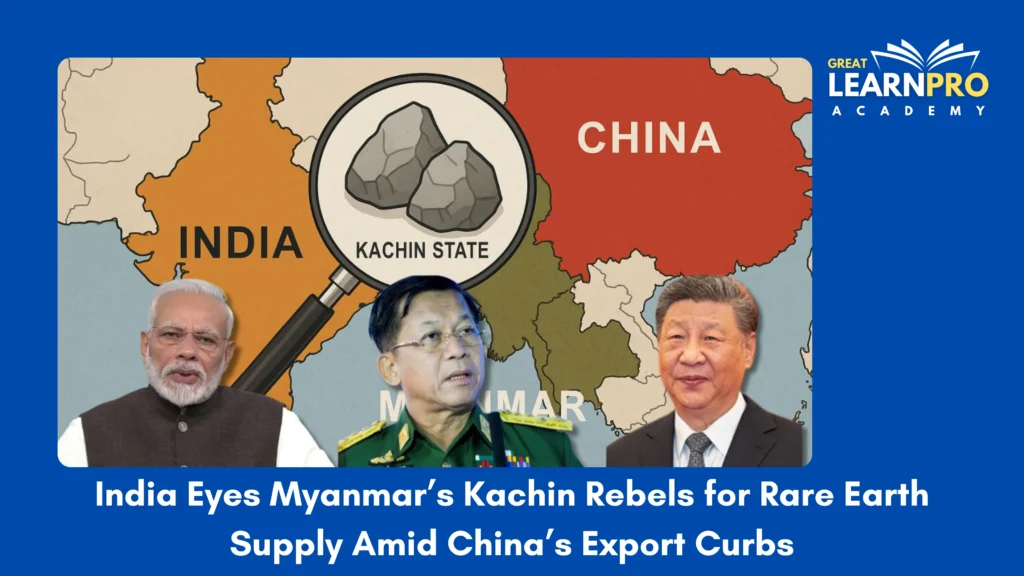India is exploring an unconventional yet strategic partnership with Myanmar’s Kachin Independence Army (KIA), a powerful rebel group controlling key rare earth mining regions in northeastern Myanmar. This move aims to diversify India’s supply of critical minerals essential for high-tech industries, including electric vehicles, renewable energy, and defense technologies. The initiative comes in response to China’s recent restrictions on rare earth exports, which have disrupted global supply chains and heightened geopolitical tensions.

China’s Dominance and Export Restrictions
China has long maintained a near-monopoly over the processing of rare earth elements (REEs), crucial for manufacturing magnets used in various applications. In 2025, China imposed stringent export controls on these materials, citing environmental concerns and strategic interests. These restrictions have significantly impacted countries like India, which rely heavily on Chinese processed REEs for their industrial needs.
Myanmar’s Kachin State: A New Frontier
Myanmar’s Kachin State, bordering China, is home to some of the world’s richest deposits of heavy rare earths, including terbium and dysprosium. Following the 2021 military coup in Myanmar, the KIA seized control of several mining areas previously managed by the military junta. This shift disrupted China’s access to these resources, leading to a sharp decline in Chinese imports from Myanmar in early 2025.
India’s Strategic Engagement with the KIA
In response to China’s export curbs, India has initiated discussions with the KIA to secure samples of rare earth ores for testing and potential long-term supply agreements. The Ministry of Mines has directed state-owned Indian Rare Earths Limited (IREL) and private firms to collect and analyze samples from KIA-controlled mines. The KIA has reportedly agreed to assess the feasibility of bulk exports to India.
This engagement marks a significant shift in India’s foreign policy, as it represents a rare instance of cooperation with a non-state actor. The KIA’s control over the mining regions provides India with an opportunity to access critical minerals outside China’s influence.
Challenges and Considerations
While the potential benefits are substantial, several challenges accompany this initiative. The remote and conflict-prone terrain of Kachin State poses significant logistical hurdles for transporting mined materials to India. Additionally, India currently lacks the domestic infrastructure to process rare earths into finished products, relying instead on Chinese processing capabilities. To address this, IREL is seeking international partnerships to develop the necessary processing infrastructure.
Moreover, the political and ethical implications of engaging with a rebel group are complex. The KIA’s involvement in ongoing conflicts raises concerns about the legitimacy and stability of such partnerships. India must navigate these complexities carefully to avoid potential diplomatic fallout and ensure compliance with international laws and norms.
Broader Implications for India’s Rare Earth Strategy
India’s exploration of alternative rare earth sources aligns with its broader strategy to reduce dependence on Chinese-controlled supply chains. The government is reportedly preparing to introduce fiscal incentives to promote domestic production of rare earth magnets, aiming to bolster the country’s manufacturing capabilities and enhance energy security.
Furthermore, India is actively engaging with other countries to secure access to critical minerals. Recent agreements with Myanmar include enhancing cooperation in trade, connectivity, energy, and rare earth mining, reflecting India’s commitment to strengthening bilateral relations and securing strategic resources.
Conclusion
India’s engagement with Myanmar’s Kachin rebels represents a bold and unconventional approach to securing access to critical rare earth minerals. While the initiative offers potential benefits, it also presents significant challenges that require careful navigation. As global competition for rare earths intensifies, India’s ability to diversify its supply sources and develop domestic processing capabilities will be crucial in determining its position in the evolving global supply chain.
Sources:
- https://www.reuters.com/world/asia-pacific/myanmar-rebels-disrupt-china-rare-earth-trade-sparking-regional-scramble-2025-03-28/?utm_
- https://m.economictimes.com/industry/indl-goods/svs/metals-mining/readying-fiscal-incentives-for-domestic-rare-earth-magnet-production-h-d-kumaraswamy/articleshow/123847166.cms?utm_
- https://www.reuters.com/world/china/india-explores-rare-earth-deal-with-myanmar-rebels-after-chinese-curbs-2025-09-10/?utm_
More Current affairs: https://learnproacademy.in/updates/
